 |
| As a thousand head-canons split right down the middle, David Banks can only weep. |
In a word? Gosh.
This felt as much like a series finale as a season finale and I found myself more than once thinking of the end of Robin Hood eight years ago. Like that there's a sun-drenched forest, marching knights and death machines attacking civilian outposts, the new female villain teaming up her psychotic hirsute male predecessor, bad guys turned good stabbed in the back, a hero destined to die seeing visions of loved ones after blowing up the bad guys in a thermonuclear explosions, comic relief characters leading bystanders to safety through secret passages under the forest, characters dying alone and unmourned by anyone bar the audience, the sudden last second return of a character thought very-long-lost and dead, the main characters considering moving on now the hero's dead...
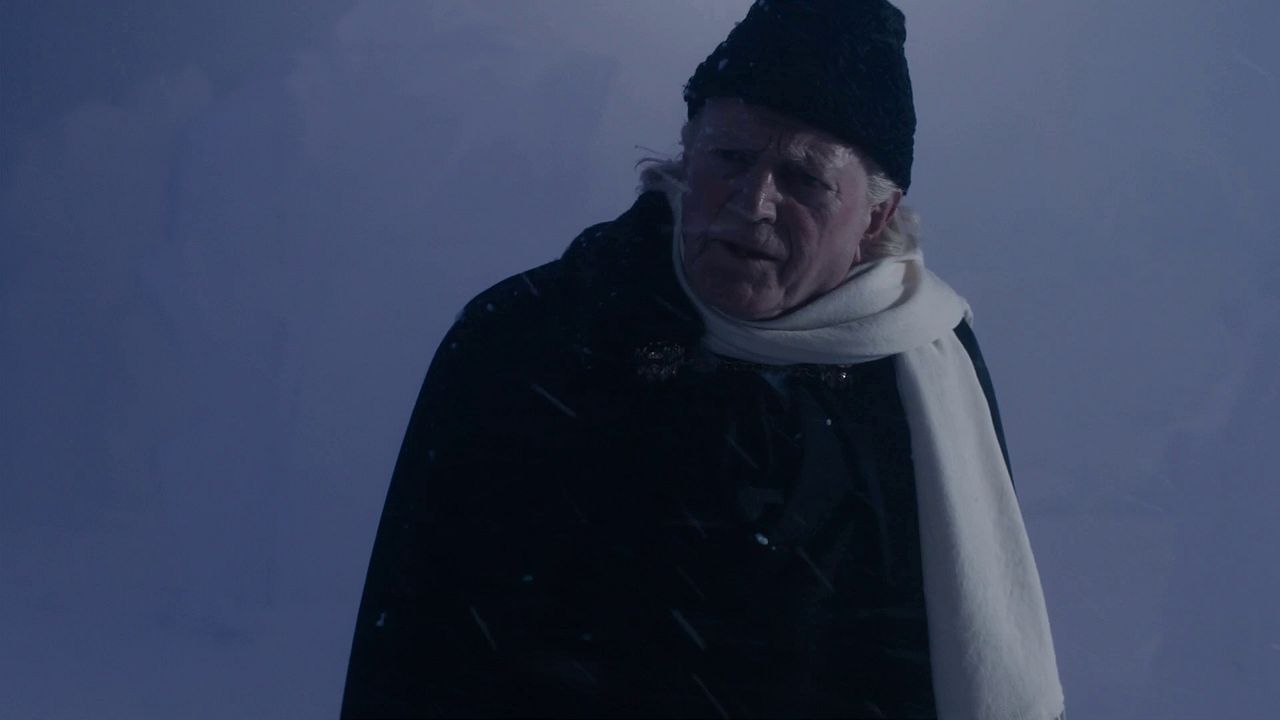 |
| "Hmph. You've stolen the Cybermen from my last story - I should say I should deserve something in return, don't you? Hmm? You great big grey Scots bastard!" |
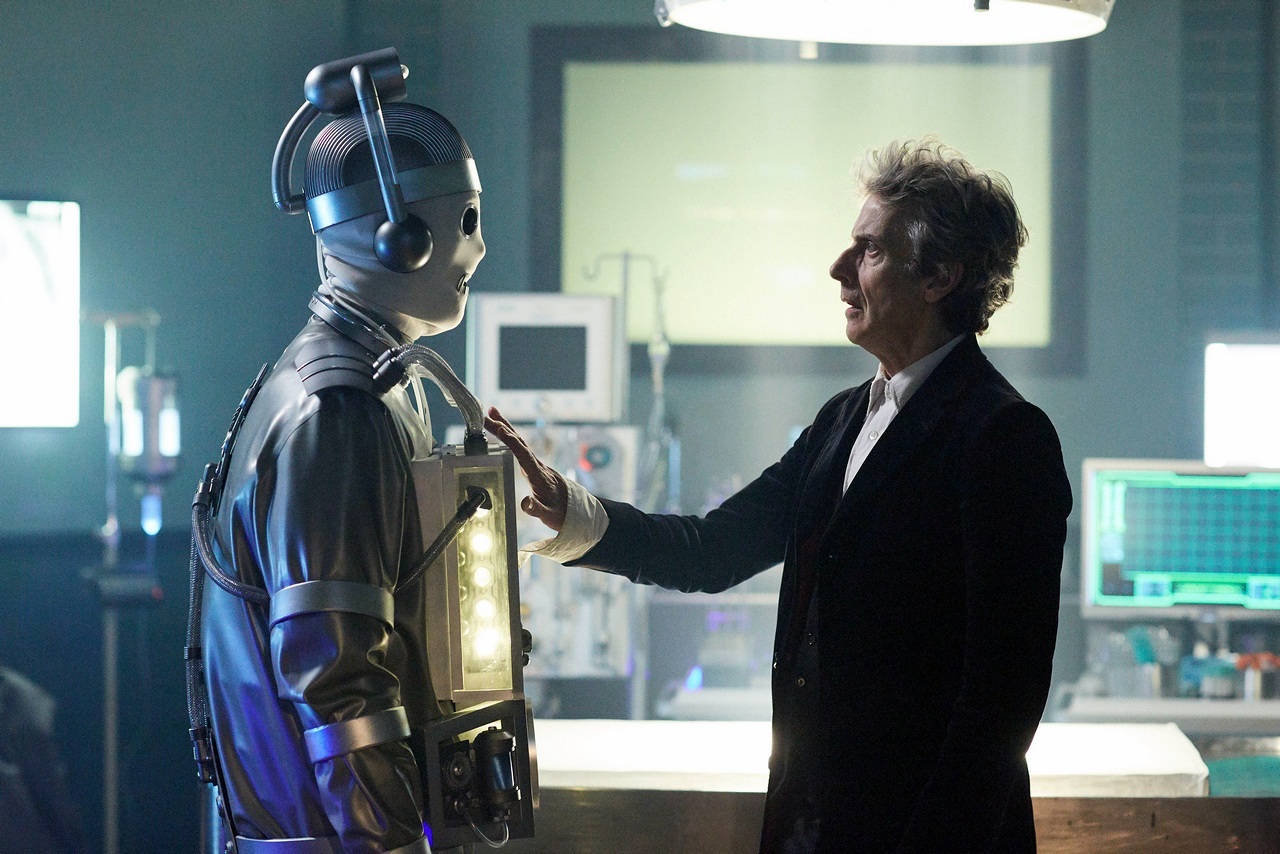 |
| Yep. This is the sort of fanwank that could raise Craig Hinton from the dead. |
Poor Steven Moffat has spent all his time since 2009 trying to please the fans and give them what they want without any Faustian twists or "hahah, I'm writing crap deliberately to prove a point no one will realize for decades hence" logic you might find trotted out by Rob Shearman or Phil Sandifer. In 2010, he gave them a new series of RTD-era Who. In 2011, he gave them all the time paradoxes, story arcs, visual gags and River Songs he could. In 2012, he gave standalone stories everyone would like. In 2013, he produced a chain of episodes celebrating each Doctor's era and then tied off everything in a neat Christmas special. In 2014, he gave the fans a dark, gritty and serious show with an older Doctor, Time Lady villain and scary monsters. In 2015, he gave them even more dark grittiness plus fanwank plus Game of Thrones stuff.
And now, after a year off and recoiling from public apathy (you need only see Gogglebox Australia to see how poorly "normal" folk cope with ultra-dark sequel-prequels to Genesis of the Daleks), the majority of fandom made their final request. Make Doctor Who good again, make it a show the not-we enjoy and cherish rather than something isolated and uninclusive. And so Moffat did.
For all the "brand new beginning" aspects thrown around, Season 10 has been focused on the theme of last chances, appropriately enough. The moment to recognize the status quo is untenable and what to do now. It's been in every episode, as characters realize they have to change or die out. If it's the colonists making peace with the Emojibots or the Celts teaming up with the Romans or the British allying themselves with the Ice Warriors, acceptance is achieved and new beginnings made. The Landlord, that twat in Thin Ice, the Oxygen companies and ultimately the Saxon Master all refuse to acknowledge this is the end of the line and they all pay for it with their lives.
It's quite a thought that ten years ago, the climax to the eleventh episode of Doctor Who was quite simply the most epic-brain-blowingest thing ever. It involved a benevolent near-comedy stereotype turning out to be the Master, as played by John Simm. Indeed, it's hard not to see other echoes here - a vast and doomed colony ship of humans who end up turning to psycho cyborgs at the Master's behest, for a start. Near regenerations, flashbacks, cast-changes and a base besieged by an unstoppable army the Master's left to deal with the Doctor while he buggers off sharply in the opposite direction.
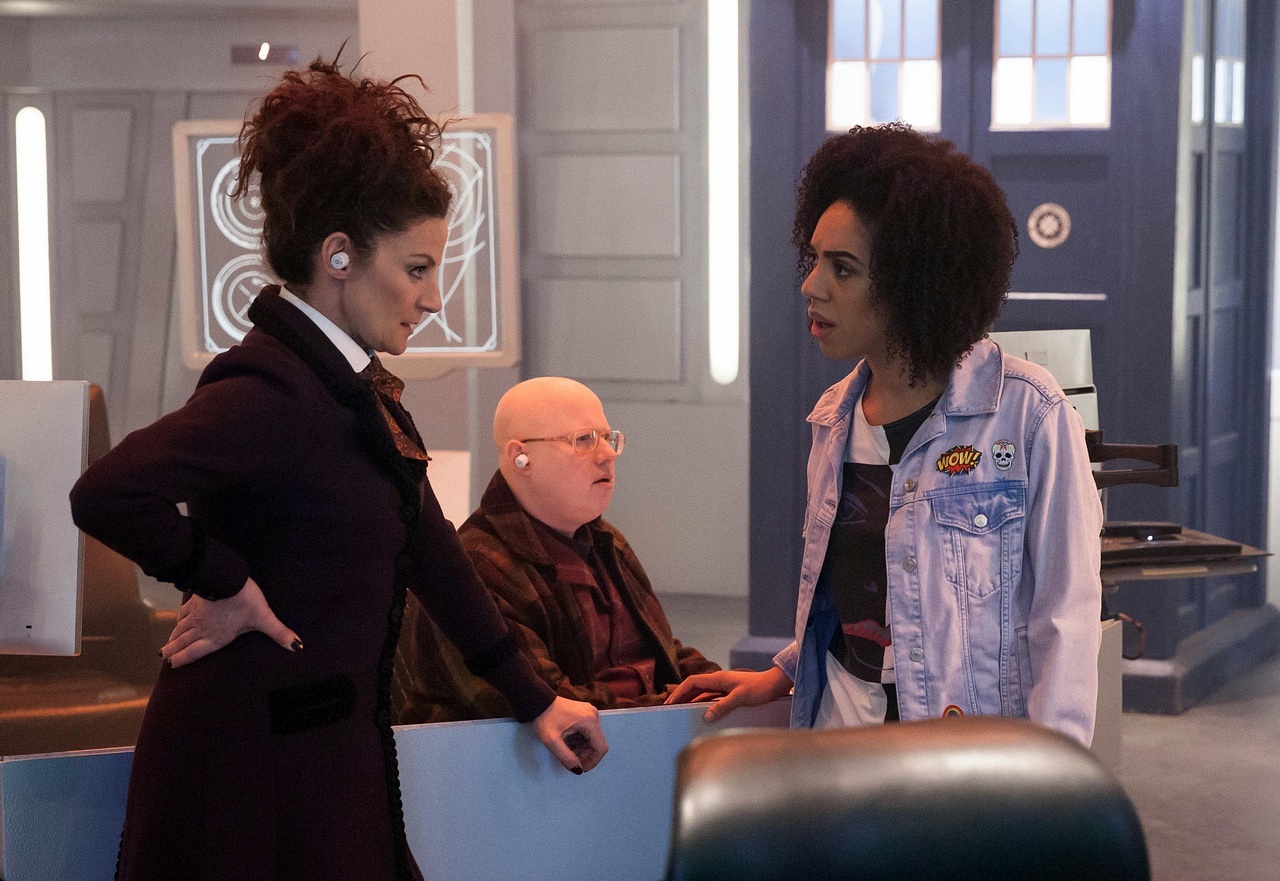 |
| "Zathras tell them but they not listen. No, no. Nobody listens to Zathras..." |
Perhaps the Master will be resurrected by the new regime, but right now it seems the evil Time Lord's gone for good and it matches the appropriateness of hir previous defeats. After dying out of spite, dying to save the Doctor, being killed by the Brigadier, what could be better than dying both because the villain can and cannot change? For all the fiery CGI on display, we never do see a regeneration from Simm to Gomez and instead have the far more memorable sight of them laughing hysterically in their display of mutual murder, like the end of Eat the Rich or The Killing Joke. In a civilization they forced into constant adaptation and evolution, their stubbornness ends them both. Of course they were going to laugh!
 |
| "Chronic Backstabbing Disorder? Hey, we resemble that remark!" |
Could Missy have turned good? We may never know, and perhaps in a wibbly-wobbly paradox the reason Missy was even open to the idea was the subconscious knowledge she was properly doomed. The Doctor challenges the pair to wonder just where and when they're willing to die, and we know at least Missy wanted it to be with the Doctor while Saxon wanted it as far away as possible.
Missy's not the only regular written out, of course. Nardole concludes his rather slipshod internship in a blizzard of Britcom cliches (see Little Britain as he casually triggers thermonuclear destruction without looking up, Coupling as his drinks clink with a love interest, Goodnight Sweetheart as a time distortion leaves him stuck on the wrong side of the looking glass). We still know nothing about him except he was once a very unsavory character who has been partially reformed by the Doctor and River Song. His final fate is not dissimilar to River's, condemned to live a pastoral life with children and friends but the nagging realization he'll never see the Doctor or the TARDIS again as well as the dread this happy ending is very much running on borrowed time. The Doctor's loyal butler let him blow up, but unlike Alfred in The Dark Knight Rises, the chances of him seeing his former employer alive and well later on are non existent.
Even so, Nardole, you'll be missed.
 |
| The Mondas Abbey Road album cover. |
Bill's excellent and/or bogus adventures come to an end but for the first time since Martha Jones we have the suggestion she might be back next year. Normally companions have the doors locked after them, but there's every possibility she could be back. Or we might never see Bill again, but at least she gets a decent, happy ending. There's none of the angst or doom weighing down on her predecessors, or even Nardole, and it feels like a reward after seven years of Moffat grinding characters under his heel for his own sadistic pleasure.
No doubt some would have relished Oxygen or Extremis or Lie of the Land had she actually died in that, but instead these near-misses have forced Moffat to finally fulfill his desire to inflict the nastiest of all possible fates on a companion. And let it stick - because we saw too soon Donna's face hadn't really been cut off and stapled to a statue and she was fine, and Amy got over the whole "forced to give birth at gunpoint and watch child melt" quicker than I have the dreaded flu. How many times has Moffat killed off a companion? Death, arguably has lost meaning, which is why he goes one further.
He turns Bill into a Cyberman.
 |
| "OK... don't panic, Bill, this can still work. I mean, everyone loved Kroton..." |
Her initial death (complete with Lock/Stock/TwoSmoking Barrels style gaping hole in her torso that vaporizes her heart, lungs and most importantly boobs) is little more than a plot-point emphasizing that the Twelfth Doctor is rubbish at keeping his companions safe. This is the point where their dumb luck runs out, leading to Bill's ultimate departure, the realization this fun life is like the Doctor: fatally-flawed.
Bill is resurrected in minutes of both screen and story time before she gets another Moffat torment - forced to live an empty, false life waiting for the Doctor to catch up with her. Saxon says she spent ten years down below (though the counter suggests closer to three), deprived of any real human contact and trapped in a madhouse full of muted zombies begging for death. Like Rory the Auton and Oswin the Dalek, her retained humanity is a torment and she can barely control her killer instincts and blowing up her own side. Her emotional strength leads to a fugue state barely more than madness and when she finally keels over in her Mondasian get-up it's hard not to think of it as some kind of relief.
It's been made clear no one can change Bill back, that she's past the point of no return and the biggest kindness the Doctor can give her is to blow her head off. So how can she possibly be saved? For all the timey-wimey history reboots, both Rory and Oswin were only saved by the ones they love and it feels perfectly right that Bill's love Heather returns to sort her out as promised (and getting three times the dialogue of her first episode). The final scene with them in the TARDIS discussing their future almost felt like this would be a reboot with Heather replacing the Doctor as the time-traveling wanderer, and certainly not the raw fanfic fuel of Clara and Ashildr flying off in their own TARDIS.
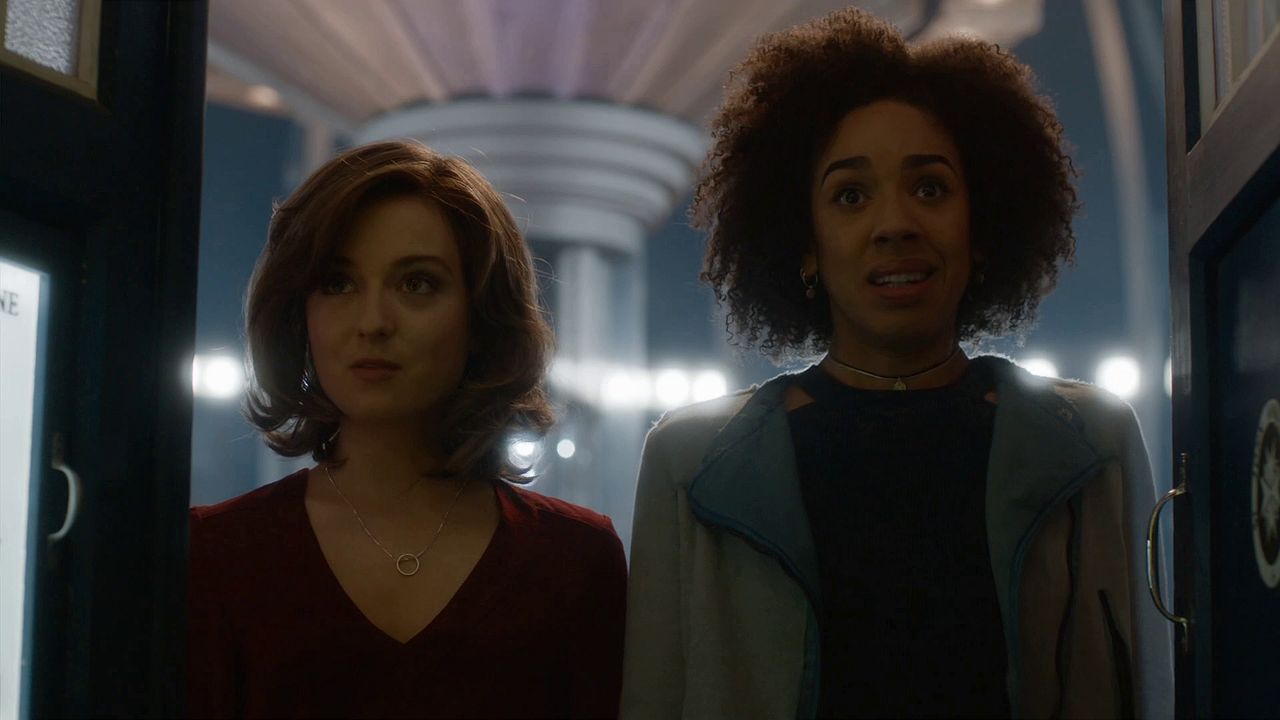 |
| "Marriage equality? Where we're going, we won't need marriage equality..." |
 |
| Moffat-cliche # 347123 - young girls on the Slow Path watch Doctor Who on TV |
 |
| ++"Delete"? I'll give ya "delete" ya young whippersnappers!++ |
Moffat throws a cheeky wink here at the various other origins of the Cybermen by bluntly saying that they ALL are equally valid. The Cybermen were created on Mondas like Spare Parts showed, but also on Telos as all those Target introductions by Kit Peddlar did insist. And Planet 14 and Marinus as well! Yes, Moffat went on TV and canonized The fucking World-Shapers! (Well, to an extent, given The World-Shapers contradicts itself so often that the matter of Old Jamie, the Voord and Time Lords effectively cancel each other out). The point is, man will grow proud, god will punish them for their hubris and the next thing you know, the Cybermen are everywhere. It even ties in with other stories like The Mahogany Murderers, Industrial Evolution, Hope, The Girl in the Fireplace, Subterranea and The Heroes' Stories to show other flesh-steel variations could turn out to be the next generation of Cybermen if given half a chance.
Be they armored soldiers to fight a war, upgraded experiments-cum-butlers, or a fashionable intermix of technology, the Cybermen will always keep turning up. Hell, what else are the Toclafane when all is said and done? Remember, Telos means "logical endpoint" after all. Sooner or later, there will be machinery that needs people for organic fuel and removal of emotions. Moffat always cited Victory of the Daleks as an attempt to turn the monsters into a continuous ever-present threat. Well, he managed that with the Cybermen, but he's still left Skaro's finest looking like crap... literally. Will the next Christmas Special finally given them a decent outing?
Somehow, I doubt it.
 |
| The Cybus-Men show off their awesome blanking-people-in-polite-society power. |
And so, to Capaldi's Doctor. Again, he is defined by the fact he's basically not good at his job of being the Doctor. He couldn't keep his oath to keep Missy trapped, he couldn't keep Bill safe, he can't even die properly. The Doctor's final, desperate half-arsed rant to Saxon and Missy of why he would choose to stay and fight a pointless battle on the slim chance of saving some innocent bystanders sums it up. He gets nothing out of it, not even the satisfaction of a job well done, but he has to try.
This Doctor's whole journey from Trenzalore onwards has been trying to recarve his place in the universe, and he's frankly not done well but that's not the point. As he said in his first episode, he is not expecting to get into the Promised Land any more. He's not after a reward. He just wants to be able to live with what he does.
 |
| The Master tactfully decides not to compare and contrast Moffat and RTD's epic finales. |
And like Trenzalore the Doctor once again chooses to save a bunch of gormless farmers from an army of Cybermen with his mortality very much on the line. In Deep Breath, the question was raised of just how much of the original Doctor is left. The Doctor has committed the sin of living on past his own time when he should be dead and buried, a Doctor who is in his own words "a clerical error". He wastes regeneration energy like water on Skaro, and here he's shooting off fireworks every few seconds. It seems an electrifying bear-hug from a Cyberman on top of some pistol whipping by Saxon and then being caught in a shuttle crash has burnt the candle at both ends. He collapses at one point two weeks later, fighting off his regeneration - before getting repeatedly shot and caught in the heart of a massive explosion.
(Though his NuWho Logopolis-style regeneration flashback montage doesn't feature Micky, Wilf, Rory or Strax. Which bugs me for some reason. It does feature Rose, Martha, Donna, Sarah, Amy, Clara, Vastra, Jenny, Missy, Nardole and Bill.)
The Doctor refuses to regenerate, having seemingly tried a new lease of life and finally got sick of it. When one of Bill's special water tears reboots his body, he's still determined not to let himself transform and of course the TARDIS responds by dumping him in the Arctic at Christmas 1986 where the Doctor is about to undergo his OTHER first regeneration for the first time - which in turn neatly ties in to the latest BF boxset as the Time War attempts to undermine the events of The Tenth Planet.
 |
| Awesome moment. Never happens in the episode, but still better than The Tenth Planet. |
Hartnell didn't get a decent farewell, all told. But perhaps this time, it'll be different.
It is, after all, our last chance to change things...
 |
| At last, another bloody poster! I haven't been able to mock one of these for months! |
And so, Whovians comes to its end and dear god let it not come back the same. Without variety, the best humor comes from the off-the-cuff remarks from comedians rather than the labored gags Rove engineers. The He Who Knows segment is just a five minute segment of crappy photoshop and Who-related insults involving said photoshop. The Doctor Who auditions were, at the end of the day, ruined by giving ABC personalities some random fanwank to spout and unsurprisingly Barry Cassidy came off best, playing the Doctor as a pacing, aggressive tactician working out his moves with the help of his companions. Kitty Flannagin wasn't bad, mainly because the humor was her oh-so-witty stubborn refusal to listen to anyone and assume she was auditioning for ER. Everyone else was trying too hard or quite clearly had no idea what they were actually doing (like those harpies from the Checkout who could only make Jedi jokes).
It appears the prick from He Who Knows actually comes up with most of the scripted material, so Rove at least is let off. His enthusiasm is genuine, his affection is true and he doesn't give himself the easy task of trying to control an audience who've just watched a Who ep and want to talk among themselves. Only when he's high-adrenaline "WOW!" behavior collides with the sleep-deprived British guests does it seem inappropriate - like the grown ups in Cardiff are patiently dealing with a hyper child. As for the guests? Tegan's not-in-depth obsession is a counterbalance to the other hardcore folk, and Adam Richards is quite tolerable when not being asked to come up with ridiculous theories every minute. Bajo has either two settings, both of which are offensive, and even makes George Christiansen a more pleasant co-host. Cal Wilson improvs everything, proving effortlessly entertaining and never once convincing you she even remembers last week's episode, and Celia... oh, Celia.
As Micallef pointed out, the format was essentially flawed - watching a bunch of "nerds" describe an episode you've just watched as if their opinions actually count for anything is lame. Some have suggested if it was less chatty and more active, sort of like Spics and Specs with quizzes and activities, it would have a better rhythm. "True or false: the Doctor once said on screen he was best friends with Chairman Mao. The first word a Sontaran says in Doctor Who is "peace". You can see John Barrowman's cock out during the regeneration scene in The Stolen Earth." "Describe Into The Dalek without mentioning Daleks." "Identify this target novel being sung." "Draw charades of a monster name..."
Oh well. They tried, but I'm more annoyed Whovians got regular publicity and Doctor Who didn't. The irony is, everyone in Whovians would be just as pissed off.

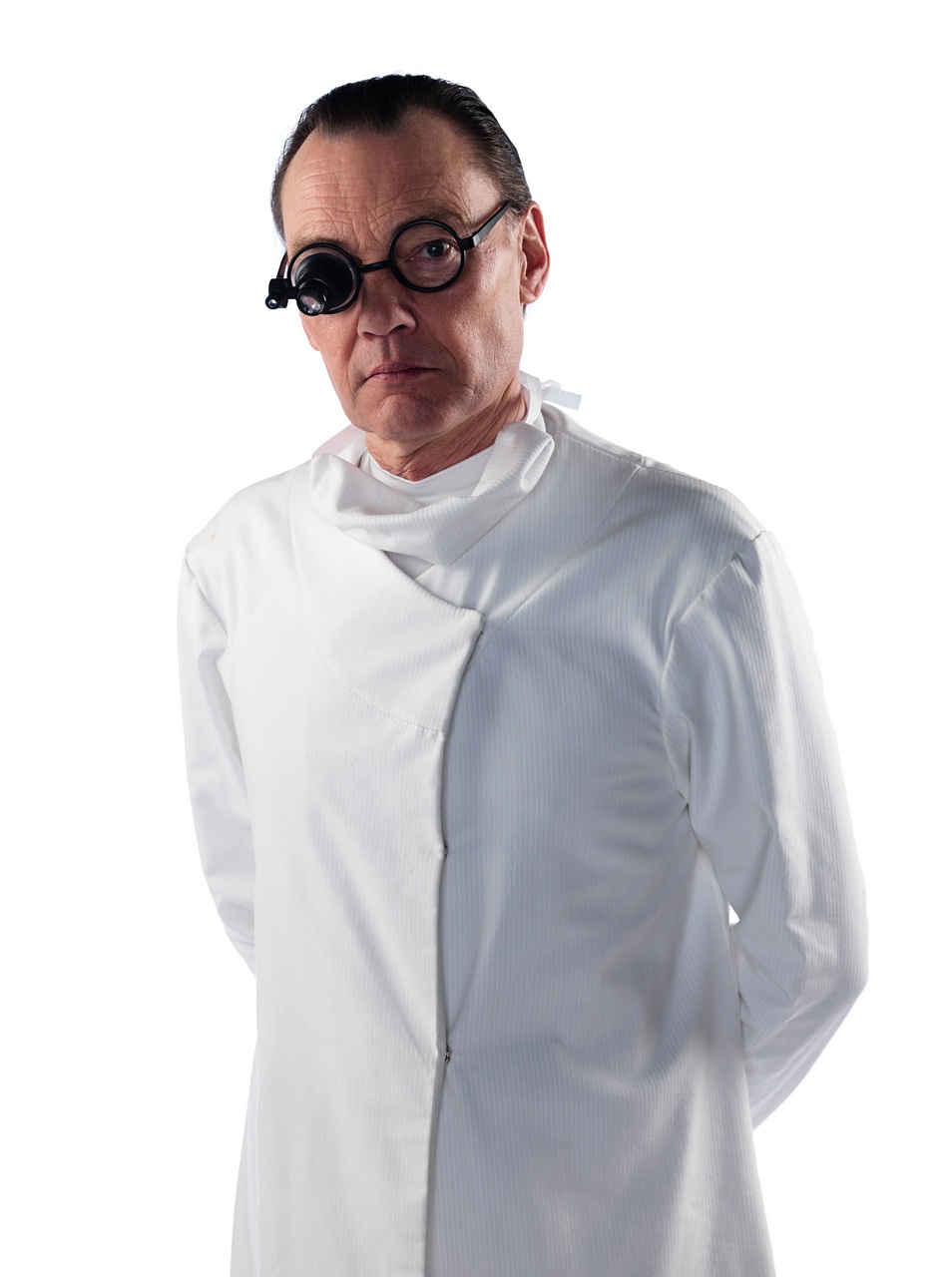


No comments:
Post a Comment